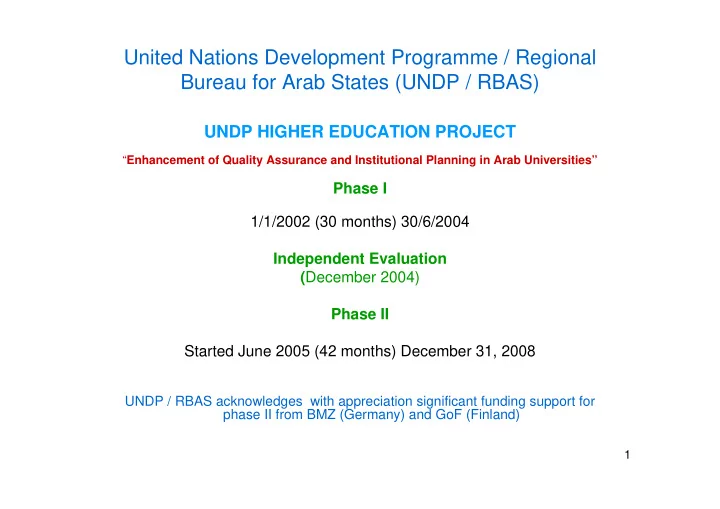

United Nations Development Programme / Regional Bureau for Arab States (UNDP / RBAS) UNDP HIGHER EDUCATION PROJECT “ Enhancement of Quality Assurance and Institutional Planning in Arab Universities” Phase I 1/1/2002 (30 months) 30/6/2004 Independent Evaluation ( December 2004) Phase II Started June 2005 (42 months) December 31, 2008 UNDP / RBAS acknowledges with appreciation significant funding support for phase II from BMZ (Germany) and GoF (Finland) 1
PROJECT’S AIMS AND COMPONENTS To introduce: � on a regional level, � through voluntary partnership with leading Arab universities, � through the efforts of the academic representatives of participating universities � backed by intensive training and advisory support from project Three independent instruments of quality assurance and enhancement: A. EVALUATION OF ACADEMIC PROGRAMS Through internal and external (peer) evaluation B. ADMINISTRATION OF INTERNATIONAL TESTS For assessing the performance of students of reviewed programs (Major Field Test – ETS) C. DEVELOPMENT OF STATISTICAL DATABASES For participating universities in accordance with commonly agreed data definitions and specifications 2
MAIN ACHIEVEMENTS - 1 A. Evaluation of Academic Programs (Cycle duration = 15 months) – Cycle 1 (2002-2003): review of Computer Science programs in 15 universities – Cycle 2 (2003–2004): review of Business Administration programs in 16 universities – Cycle 3 (2005-2006) : review of Education programs in 23 universities – Cycle 4 (2007-2008): review of Engineering programmes in 19 universities 3
MAIN ACHIEVEMENTS - 2 B. TESTING PERFORMANCE OF STUDENTS OF REVIEWED PROGRAMS (using Major Field Test, ETS) � Cycle 1 (2002-2003) English-based CS + BA tests (788 senior students). � Cycle 2 (2003-2004) Arabic / French-based CS + BA tests (921 senior students). Translation: UNESCO Beirut Office � Cycle 3 (2006-2007) Administration of a jointly developed ETS- Project test in Education to 1500 senior students in Education in 24 universities (May-June 2007). Joint ownership � Cycle 4: Administration of Global Test in Major Studies (GTMS) to 1500 senior students in Engineering, in 20 Arab universities. C. STATISTICAL DATABASE DEVELOPMENT � One cycle (2002-2004) Statistical database development in 15 universities in accordance with common data definitions and specifications (about 500, 000 students). Regional report this year. 4
EVALUATION OF PROGRAMMES 5
OUTCOMES – 1 INTRODUCING METHODOLOGIES OF PROGRAMME REVIEW � An adaptation of QAA (UK) Academic Subject Review (ASR). Our own Handbook � Three stages: – Self Evaluation: by the program providers – External evaluation: By peer reviewers (on-site visits) with active participation of university representatives – Final reporting: by peer reviewers � Introduced to /implemented by 36 leading universities. With very few exceptions, as their first experience in professional programme review (self-evaluation followed by peer review and reporting) � Generic: discipline-independent, system independent, supportive of other methods ( e.g. accreditation) � Underpinned by outcome-based approach to learning: an instrument of quality assurance and programme reform � First step towards institutional evaluation 6
OUTCOMES - 2 GENERATING AGENDAS FOR SELF-IMPROVEMENT AND REFORM For each university : An individual review report ( 54) : – Evidence-based analysis and assessment – Identification of weaknesses and strengths – Graded judgements ( comparisons) – Graded sub aspects ( Special indicators) – Recommended improvements – Awareness / internal action in most. Follow up action taken by about 1/3 . Depends on resources. Need for development support ( e.g. national / regional fund, Tempus). For the region: An overview regional report for each subject (3) : – Patterns of strength and weakness – Comparative charts of graded judgements and special indicators – Recommended areas for reform through regional collaboration and consultation – Enables development by academics / associations in the field of subject – based benchmark statements, guidelines. Much needed. Education cycle charts 7
OUTCOME 3 CAPACITY BUILDING � Capacity Building is integrated into the structure of the Project’s review cycle. A means and an outcome – Three training workshops on internal / external evaluation. Technical advisory support provided throughout cycle . – Trained representatives take lead in self evaluation, preparation of self evaluation documents , hosting of peer review missions. – Selected group from trained train ed representatives ( about 2/3 ) take part in review missions in other Arab countries.(2 out of four reviewers) � About 110 trained representatives. Cohort of 71 fully experienced (i.e. including peer reviewing) first three cycles to exceed 100 after engineering cycle. First regional cohort. � Most playing a leading role in developing quality systems in faculties and universities / countries . Leadership network 8
Structure of Review Cycle (15-18 months) Self-Evaluation Workshop 1 Training Process on Method Advisory Support Self-Evaluation Documents (SEDs) Workshop 2 Final SEDs Group Review of Progress Selection of Workshop 3 Regional Reviewers Training on External Review Review Missions to Final Reports Universities 9
EXAMPLE OF REGIONAL AGENDAS EDUCATION (1/7 of students) Quality / Resources gaps: � Quality gap: none of 12 teacher’s training programmes graded good. � Resources gap: > 50% of universities need improved resources. � Regional message ( as in previous cycles) : more investment in HE. At least doubling expenditure / student ( using QA considerations as a guide ) Regional consultation / collaboration, benchmark statements / guidelines needed on: � Curricula: – weak theoretical foundations of teacher’s training. – Weak application of theory to context of Education � Assessment of students is weakest link: (need wider range of methods: cognitive skills vs memory recall,, moderation, item writing). � State of Arabic text books and journals: minimum regional specifications needed Follow-ups: � Association of Arab Universities + UNESCO + ALECSO. � Jordan: Conference to be convened by M of HE 10
FULLY-TRAINED QUALITY ASSURANCE REVIEWERS BA 11 KEY: CS ED
REGIONAL PARTICIPATION • 36 leading universities in 14 Arab countries (36 university coordinators). • 108 participating academics, of whom, 71 are fully trained QA reviewers. Table: Regional Participation 12
NUMBER OF UNIVERSITIES IN EACH COUNTRY 13
TESTING OF STUDENTS CS + BA 14
THANK YOU 15
Recommend
More recommend